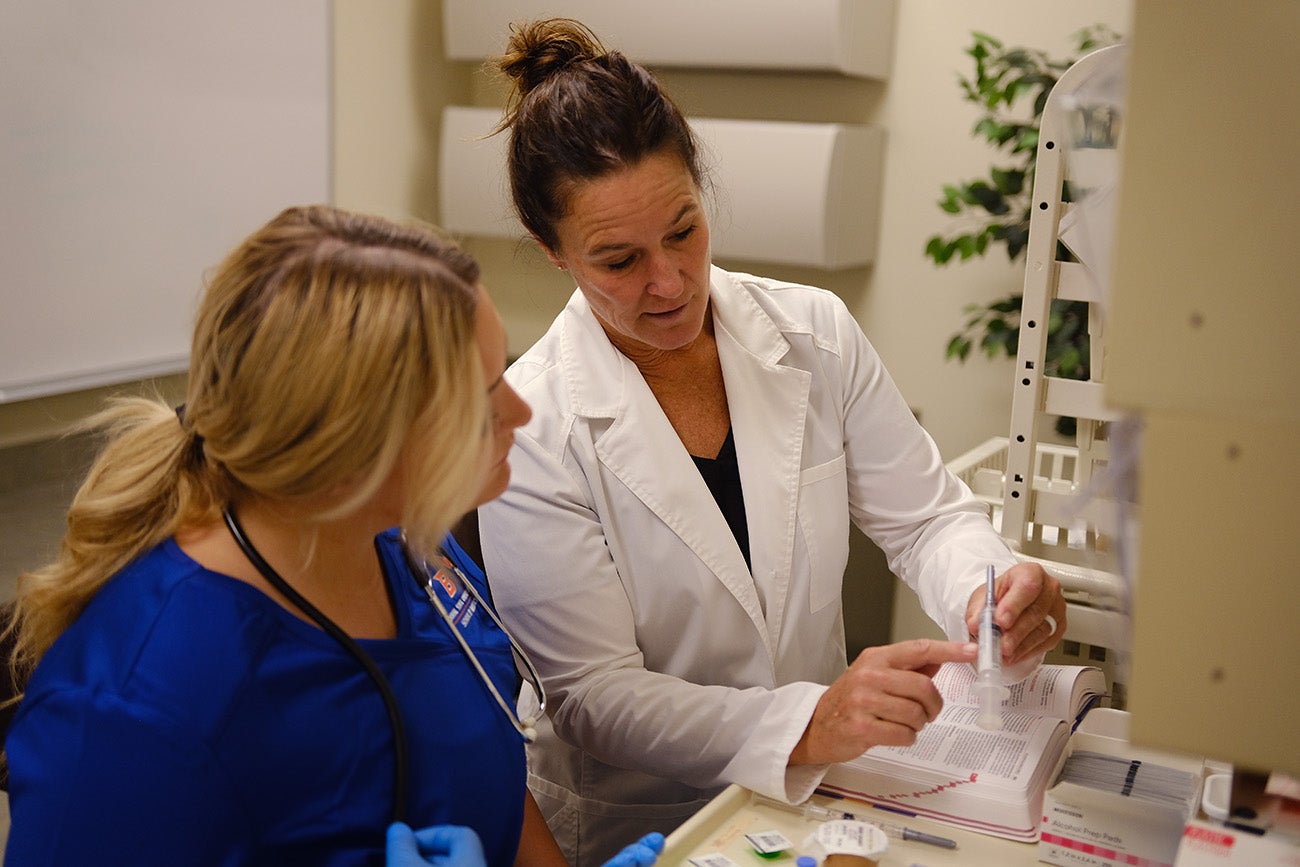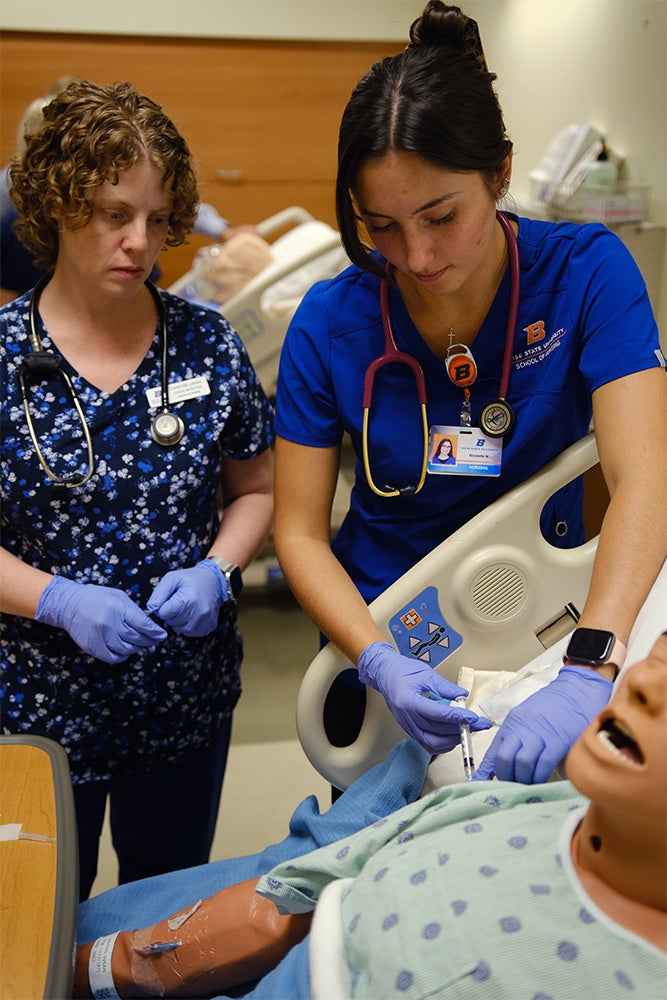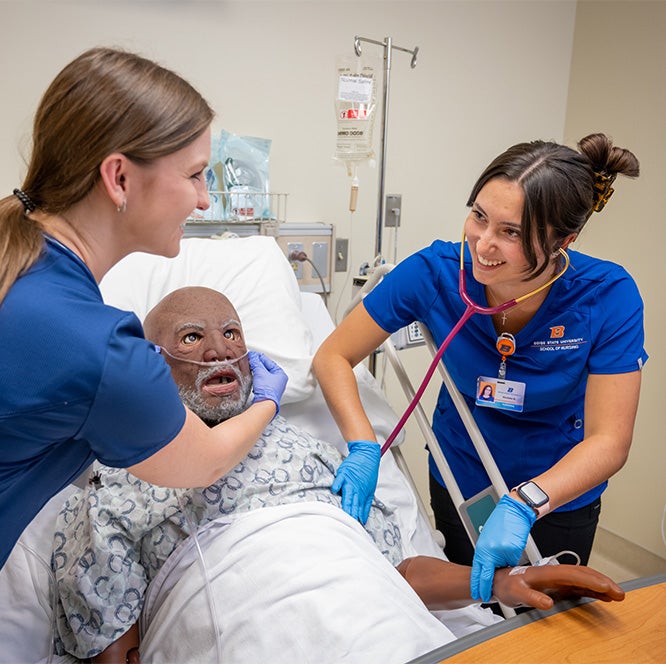The School of Nursing recently overhauled its pre-license program curriculum. The new coursework utilizes a scaffolded approach to learning, teaching students skills and reinforcing them over time and repetition. Each new time students encounter these core nursing concepts, their understanding of them – and the level of difficulty with which they apply them – grows, thus enhancing their overall skillset.

The school shaped its new curriculum around a foundation of these core competencies, determining what concepts are essential for base-level nursing skills and wide application no matter where students find jobs. These include oxygenation, mobility, safe medication administration, elimination and sterility.
“When they graduate, they should be very comfortable with those skills, not that they just saw it one time in the very beginning or somewhere in the middle of the program and now they have to try to remember it,” said Director of Simulation-Based Education and Research Kelley Connor.
Simulation scenarios grow progressively more challenging to match the students’ advancing competency levels. Not only do they draw upon skills practiced in lab, but also knowledge from didactic courses, thus melding a student’s classroom and clinical education in one environment.
How does it work?

For a competency like medication administration, it works like this: in their first semester of skills labs, students learn safe medication administration, vital signs, and how to interpret the information in front of them. In didactic courses, students learn types of medications, nursing interactions, and what to do for them. Then, these elements come together in a simple medication administration simulation scenario.
But each semester as students are presented with more challenging information, they practice medication administration on a new level.
“Maybe the next semester is going to be on insulin administration, so you’re getting the blood sugar and then you’re giving the insulin appropriately,” Connor explained. “Then in the next semester, they might be doing IV medication administration. So it’s the same kind of idea, it’s just building up on those skills based on student competency at that time.”
“We’re using the same framework for how they’re administering medications every semester so there’s this built-in autopilot: ‘I know I need to do these things,’” said assistant professor Sarah Llewellyn. “Their safety is built into their practice, so then when they do get into clinical practice, they’re making good decisions because it’s their autopilot.”
Building hands-on confidence in skills labs
The skills labs create context for students to learn and understand various clinical situations, such as types of wounds or general patient problems. For example, it would be very time-consuming and resource-draining to teach students every possible scenario in which a sterile field would be necessary. Instead, students will grasp the core concept and have the capability to understand it in broader contexts.
“They can take this idea of, ‘What is sterility?’ and apply it in different contexts and feel comfortable with their knowledge, so when they come up against something new in the clinical setting, they have that framework,” Connor said.

“We might not have the capacity to teach every sterile procedure, but students are going to be really good at gloving, setting up a field and performing a few different sterile activities,” said Llewellyn.
This approach equips students with high-quality, basic skills as well as the framework to build upon them in more complex situations in the future, which will benefit clinical partners who work with Bronco Nurses.
Skills labs also now more intentionally incorporate aspects of clinical judgment, requiring students to contextualize the tasks and skills they’re practicing. Paired with the overlap of repetitive concepts, students are more prepared than ever to enter the workforce as competent nurses.
“We really want to make sure that our graduates are able to function as registered nurses who feel comfortable and confident in their abilities and be able to translate what they’ve learned into a new situation because that’s what they’ve been doing all the way along.” said Connor.